The views expressed in our content reflect individual perspectives and do not represent the authoritative views of the Baha'i Faith.
Last July nearly 1,000 members of an African American militia marched in Georgia’s Stone Mountain Park. They marched in protest of the huge Confederate rock carving at the site, which is a known location of Ku Klux Klan gatherings.
RELATED: Derek Black: Why the Son of a Klan Leader Denounced White Nationalism
When I first saw a photograph of this, feelings of vengeance arose in my heart. I was seeing people who looked like me taking a stand to eliminate symbols of oppression. They were rising up in protest against painful emblems of chattel slavery and oppression.
Since then, reflecting on this photo and what it means has made me think about how the effort of turning to our nobler selves — humbling our own desires and ego in order to sublimate our material self —creates the victory of the spiritual self.
RELATED: Building Spiritual Immunity to Racism
Our spiritual self demonstrates through action the human capacity for love, forgiveness, and forbearance. Every day each of us gets to choose how we develop and use that innate capacity to peacefully resolve issues of conflict and discord — and it’s an effort that is harder yet more enduring than resorting to violence.
Indeed, what happened last summer in Georgia felt like a temporary, if somewhat Pyrrhic victory — that is, a victory that might lead to further discord and conflict. I asked myself if advocating the use of arms and armed force is necessary to achieve a just end? Is that true victory or simply an act of rank vengeance — of capitulating to a limited, transient power instead of using reason to create a collaborative decision to remove an object of history?
In reflecting on this matter, I called to mind the humble service and examples of overcoming violent oppression through love during the life and times of the Baha’u’llah, the prophet and founder of the Baha’i Faith. He endured exile, dispossession, poverty, torture, and humiliation for proclaiming in the 19th century the radical idea that “the earth is but one country and mankind its citizens.”
RELATED: Unity in Diversity and Racial Identification
Baha’u’llah also wrote, “Humble thyself before Me, that I may graciously visit thee. Arise for the triumph of My cause, that while yet on earth thou mayest obtain the victory.”
Achieving spiritual triumph — that is, overcoming our baser instincts of hatred and violence, overcoming a desire for material triumph, or overcoming an urge to strike out in violence and retaliation — is the goal and the daily effort of this life “while yet on Earth.”
The Bible refers to “victory” in parables of believers vanquishing the enemies of truth, justice, and righteousness — like the Israelites vanquishing the forces of Pharaoh or the Christians defeating the disbelievers of ancient Rome. Holy scripture provides numerous examples of the victory of spirit — a spiritual impulse towards that which is good and praiseworthy in the sight of God. These are the divine qualities exemplified by the divine messengers as opposed to the proliferation of materialistic worldly pursuits of “mammon” (riches or materials wealth).
If this kind of victory is considered a spiritual conquest over the lower self, leading to entrance into the eternal kingdom of God, it stands to reason that it is harder to achieve. It is more inaccessible yet cherished — a victory that is not temporal or episodic. That victory has the potential of a legacy of peace, security, confidence in an all merciful, all knowing God. It is what Jesus promised in the Lord’s Prayer when he said “Thy Kingdom come, Thy Will be done, on earth as it is in heaven,” referencing the will of almighty God — the God of equality, of fairness, of peace and security, and of the well-being of all creatures on Earth.
My efforts towards spiritual victory are rooted in study and reflection of the Baha’i Writings. Because of this, I have a personal awareness and conviction that my daily actions in this life can be a living sacrifice and a triumph over my lower nature instincts towards hatred, violence, and retaliation. In this constant, lifelong battle I strive to be what Abdu’l-Baha, the son of Baha’u’llah and his designated successor referred to as an incipient “fearless warrior. ” He wrote:
O ye servants of the Sacred Threshold! The triumphant Hosts of the Celestial Concourse, arrayed and marshalled in the Realms above, stand ready and expectant to assist and assure victory to that valiant horseman who with confidence spurs on his charger into the arena of service. Well is it with that fearless warrior, who armed with the power of true Knowledge, hastens unto the field, disperses the armies of ignorance, and scatters the hosts of error, who holds aloft the Standard of Divine Guidance, and sounds the Clarion of Victory. By the righteousness of the Lord! He hath achieved a glorious triumph and obtained the true victory.…
What are “the arena of service”, “the Clarion of Victory”, and the “true victory”? To me, they represent controlling my negative thoughts and behaviors so that my conscious actions reflect my belief in the equality of all human beings and the truth that the oneness of humanity is a divine reality. These words also help me to expect equality and justice in this temporal material life. Victory is the confident spirit of resignation to the will of God — to accepting whatever is ordained in the holy scripture, and whatever is willed for in my life.
To some this may seem like acquiescing to injustice and oppression by consciously choosing not to act in combative retaliation to vanquish these evil forces. Yet, perhaps all victories over evil are not material in nature. Perhaps the most venerable victories are spiritual in nature.
What I believe these divine teachings suggest is that spiritual victory in this temporal life is the ability to remain calm, loving, and composed in the face of hatred and violence — such as the Civil Rights marchers who demonstrated in the 1960s, or the many peaceful protesters after the killing of George Floyd. It’s using the ability to breathe, to listen, or to set boundaries based in justice when someone is shouting hatred at you.
Spiritual victory is not retaliating when you have been wronged, misjudged, or attacked. Spiritual victory is playing “the long game” of using the knowledge, skills, and abilities with which every human being is equipped to actively and positively change a situation and have control over their reactions.
Doing this is supremely difficult and can take a lifetime to effectively learn. I believe, as the Baha’i Writings state, that obtaining this spiritual victory is a “constant endeavor,” with many dips and turns. In my life, working towards victory is nurturing my capacity for humility, to accept and “radiantly acquiesce” to the spiritual guidance available in Baha’u’llah’s writings, which are the word of God for today.
Years ago, when my husband and I suffered an unexpected miscarriage, I felt God had abandoned and forsaken me. Where was the victory in enduring that tragedy? Today, as thousands die from an unrelenting pandemic and violence of all types all over the globe, people may ask where is the victory in the inexplicable pain of losing a loved one to illness or to gun violence? When these tragedies happen, is that victory over selfishness and anger? Over despair and retaliation? Over the impulse to give up the struggle for justice and righteousness?
For many of us during these unprecedented times it is easy to sink deep into sadness and foreboding about the future. It is more difficult to rise up and work to claim the spiritual victory available to each of us — to every man, woman, and child on this earth. The Baha’i Faith offers a roadmap that “the Day of God” is at hand, and despite all material evidence to the contrary, a spiritual transformation is in its beginning stages. As Abdu’l-Baha said in a talk in New York City in 1912:
The disease which afflicts the body politic is lack of love and absence of altruism. In the hearts of men no real love is found, and the condition is such that, unless their susceptibilities are quickened by some power so that unity, love and accord may develop within them, there can be no healing, no agreement among mankind. Love and unity are the needs of the body politic today.
In that same speech, Abdu’l-Baha explained:
The man who thinks only of himself and is thoughtless of others is undoubtedly inferior to the animal because the animal is not possessed of the reasoning faculty. The animal is excused; but in man there is reason, the faculty of justice, the faculty of mercifulness. Possessing all these faculties, he must not leave them unused. He who is so hard-hearted as to think only of his own comfort, such an one will not be called man.
The destiny of humanity is unity, rooted in divine justice. Each of us has the capacity for justice. Each of us has the capacity to achieve spiritual victory over life’s tests and difficulties. This capacity must be acknowledged and nurtured from infancy and developed throughout life through knowledge and truthfulness, trial and error, through intentional, selfless acts of kindness, through forgiveness, through service to all, and ultimately through humility and love.


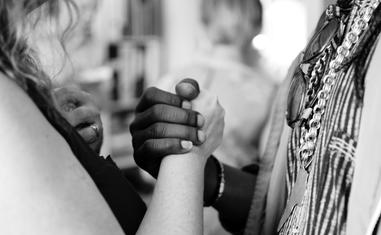


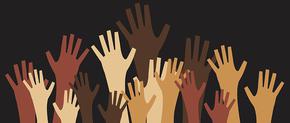


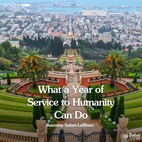

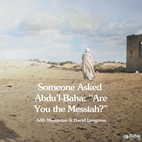
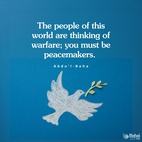
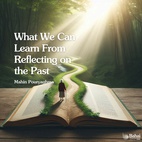

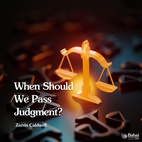


Comments
Sign in or create an account
Continue with Googleor